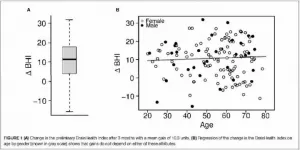A key innovation of the Project centers on the BrainHealth Index™ (BHI), which is based on a multidimensional definition of brain health and its upward potential. The BHI is a composite derived from a series of best-in-class assessments that explore multiple aspects of an individual's cognitive capacity, as well as their sense of well-being, quality of social interactions and complexity of daily routines. The result is a personalized score that becomes an individual's baseline, and that in theory has no upper limit.
"What gets measured gets managed," said Sandra Bond Chapman, PhD, lead author and chief director of the Center for BrainHealth. "For the first time ever, the BrainHealth Index gives individuals a comprehensive snapshot of their own brain's health and performance levels, which allows them to make meaningful, measurable improvements that will translate into greater quality of life no matter their starting point."
Brain Health Accessible to All The science establishing the brain's lifelong ability to change, strengthen and adapt has been clearly demonstrated over the past three decades. Since its inception in 1999, the Center for BrainHealth has been at the forefront exploring the brain's upward potential, both in fundamental cognitive neuroscience research and also in transforming discoveries into actionable protocols that are demonstrated to work.
The just-completed BrainHealth Project trial adapted these proven protocols into a methodology that combines live virtual coaching with personalized training through an app-like online platform. The limitless scalability of this approach means that people everywhere can have access to transformational science through The BrainHealth Project.
"The BrainHealth Project heralds the accessibility of brain health for all," said Sandra Bond Chapman, PhD, founder and chief director of the Center for BrainHealth and the study's lead author. "Anyone and everyone will now have the ability to discover the unique strengths and abilities of their own brain, and to begin learning brain-healthy habits that they can adopt for measurable, lifelong impact. This is how The BrainHealth Project can play a critical role in making brain health equitable for all."
The study, soon to be published in Frontiers in Public Health, featured a 12-week trial that included 180 healthy adults between the ages of 18 and 87. Participants began by taking a set of assessments regarding their levels of cognition, well-being, daily-life complexity and social interaction. Researchers applied a proprietary algorithm to create a composite score for each individual - their personal BrainHealth Index. Participants then had one-on-one live coaching sessions with a trained clinician to understand their BHI and to set personal goals. Over the following weeks, they engaged in self-paced online training punctuated by two additional coaching sessions to review progress and fine-tune goals. The trial culminated with a second BHI.
"Learning about my brain health and how to keep strengthening it has been an enriching and positive experience in every respect," said a 69-year-old female participant. "The strategies were more personally meaningful and applicable to my daily life than I had even imagined, and there is no doubt my brain health has improved as a result of using them throughout my day."
Promising Results Individual participant changes in the BHI ranged from a 38% decrease to a 60% improvement. Almost 80% of participants showed positive change in their BHI, and half of the participants showed at least a 10% increase, with no difference among men and women. Furthermore, the ability to create and sustain change did not depend on age - countering a commonly held misperception that the brain loses its ability to get stronger and work better as we get older (see Figure 1).
The contribution to these gains came from all domains of brain health: cognition, well-being, interaction and daily life. Some individuals improved due to increased resilience and decreased anxiety, whereas others improved due to increased innovation and social engagement.
Further analysis led to the discovery that various elements of brain health cluster in distinct ways, cutting across the domains of brain health. The researchers identified three sets of data points that tend to correlate most closely: Resilience - measured through a person's level of meaningful activities, happiness and social support available to them Fortitude - emotional stability derived from a sense of being anchored to something bigger than oneself, and influenced by levels of happiness, stress and anxiety Clarity - one's ability to see a way forward by employing logical reasoning, possibility thinking, solitude to solve problems, and an ability to synthesize information rather than getting bogged down in the details These findings reinforce the emerging understanding of brain health as a dynamic, synergistic whole. "Being able to understand brain health through the lens of these three factors was incredibly empowering for participants," said BrainHealth clinician Stacy Vernon, MS, LPC, NCC. "It helped them identify specific areas in their lives that contributed to their ability to thrive during the worst of times and to make adjustments in real time to keep gaining momentum."
The research team was encouraged to confirm that more than 90% of participants in the trial signed up to continue with the Project over the long term. "The true power of the BrainHealth Index emerges over time, as people track and sustain change in their own performance. When they begin to see the tremendous agency they have over their own brain health - their capacity for innovation, problem solving, decision making and so much more, it is truly transformative," said Dr. Chapman.
Getting Personal The study found that the more people engaged in training and practicing new brain-healthy habits, the more their BHI tended to improve over the three-month trial. Gains were greatest for those who completed interventional training, and they leveled off when additional content provided was purely informational (see Figure 2). Participants who completed none of the training had an average 0% improvement on the BHI; those who completed all the interventional modules (cognitive training stress) had an average 15% improvement on the BHI. Beyond those modules - informational content only - there was no additional improvement on the BHI.
Individual results were driven by each participant's unique combination of factors making up their BHI, as well as the personal goals they established during one-on-one coaching sessions. Feedback from participants further underscored how powerful personalization can be. Periodic one-on-one coaching sessions emerged as one of the most compelling aspects of the trial, setting it apart from typical "brain training" apps and online games.
There was nothing automated about this experience. The composite making up each participant's BrainHealth Index was completely unique to them, and the regular coaching sessions allowed participants to set specific goals for themselves and track their progress with support and guidance from a trained clinician.
This innovative approach also taught participants to focus on their own strengths and performance, empowering each person to continue becoming the best version of themselves - another person's score and even population "averages" are not relevant or actionable.
"Until recently, I never considered that having a brain health coach could improve mental performance just as my yoga instructor and golf coach help me improve in those areas," said a 74-year-old male participant. "I am learning that brain performance can be measured and improved. I wish I had access to many of these tools while I was still working and building my career; however, I feel like my brain health and overall well-being are moving in the right direction, and that feels good at any age."
A Silver Lining from the Pandemic As the study was conducted during the height of COVID-19, researchers were able to investigate effects of the pandemic on participants' brain health. The vast majority of participants felt heightened stress, worry and anxiety related to their health and economic well-being, and that of their loved ones.
Gaining new insights into the brain's immense ability to adapt and innovate provided the context and practical steps many needed to overcome new challenges. One 43-year-old female participant experienced the extra isolation of moving to a new city during 2020, in addition to working in an industry severely impacted by the pandemic. Once she began to see innovative solutions to some of her most significant challenges at work, she reported her stress level decreased and her sleep improved. She reported, "I finally started to feel like myself again."
Addressing a Global Crisis The pandemic has wreaked havoc on the health and stability of individuals and economies alike over the past year, exposing multiple crises - job loss coupled with deep and permanent shifts across all industries, high rates of depression and suicidality that show no signs of letting up, and sclerotic education systems struggling to prepare the next generation to tackle the new challenges that lie ahead.
Within these crises also lies an urgent obligation to create a new and better path for the future. People everywhere will need to draw on their resilience, fortitude and clarity to solve the unpredictable future and challenges ahead and pave new avenues to thrive.
A healthy brain, optimized to function at its best, makes every aspect of life better. Armed with a new understanding of the brain's lifelong upward potential and our ability to affect it, better brain health and performance at the population level can lead to transformational worldwide change.
The workplace presents one clear example. Organizations that invest in employees' brain health and performance as a critical, measurable asset as well as a competitive advantage will position themselves to reap the rewards of a more purpose-driven, engaged and innovative workforce. At a large scale, better brain health in the workplace can spur economic transformation.
The Center for BrainHealth is part of an international collaboration that recently developed a science-based plan for economic recovery called the Brain Capital Grand Strategy. One key will be the BrainHealth Index, which has now been tested and proven through the just-completed study and could serve as a predictor of when a community, corporation or country has the wherewithal to be resilient.
"The pandemic exposed several economic challenges including the need for many workers to reset and reskill, and the need for companies to maximize their most important asset, the brain trust of their employees," said Tom Leppert, co-leader of The BrainHealth Project. "Better brain health and brain productivity can lead to significant increases in workforce output around the world, unlocking and unleashing untapped reservoirs of economic growth potential."
Public Health - Left of Boom The potential for improved public health is just as vast. An array of population health challenges today - chronic stress, depression, anxiety, isolation, suicidality, Alzheimer's and more - are centered on the brain. An early, proactive focus on brain health can enable people to build reserve and resilience that might mitigate or even prevent decline stemming from disease, disorder or injury.
"Most people don't even think about their brains until something happens to it - boom!" said Geoff Ling, MD, PhD, a professor and physician with Johns Hopkins and a co-leader of The BrainHealth Project. "By strengthening the brain's health and function before anything ever happens to it - getting 'left of boom' - we are giving ourselves a tremendous level of protection to mitigate, overcome or even avoid some of the tough challenges that may lie ahead."
Furthermore, the demonstrated effectiveness of the online and virtual delivery for all aspects of the Project underscores the scalable opportunity for this telehealth model.
Birth of a Movement Having successfully tested the online delivery mechanisms for the BrainHealth Index and the self-paced training modules through this trial, The BrainHealth Project will continue to scale up exponentially over the next several years, with the potential to reach millions of people worldwide, of all ages (8-100) and circumstances.
"For millions of people, their minds are a mystery to them - like computer software without a toolbar to control how it operates. The BrainHealth Project offers that toolbar to help everyone build brain health and all its emotional, social and cognitive aspects," said Ian Robertson, PhD, co-director of the Global Brain Health Institute, professor emeritus at Trinity College-Dublin, and co-leader of The BrainHealth Project.
"There is simply nothing more important than brain performance. A brain that can think critically, function under stress, be resilient in the face of trauma - a brain that is thoughtful, creative, socially active. We all need and want that kind of brain," said Admiral William McRaven (ret.), spokesperson for The BrainHealth Project. "This is an opportunity to fundamentally change the world."
Precision Health Fueled by Big Data As tested in this trial, The BrainHealth Project will generate unprecedented amounts of data over time related to the BrainHealth Index, training utilization, mastery of new brain-healthy habits and more. This vast, anonymized data will be shared openly with collaborating researchers to uncover new insights and pave the way for precision health on a level never before seen.
"Robust data analysis and ongoing machine learning algorithms will one day allow us to move from precision health to predictive health with individualized modeling," said Dr. Chapman. "Scaling these individualized evidence-based brain health protocols will ultimately move global public health to an entirely new level."
"A generation ago, the aerobics revolution created a new awareness of our power to make our hearts healthier through exercise, which eventually led the medical establishment to embrace proactive, preventive protocols," said Mark D'Esposito, MD, neurologist and cognitive neuroscience professor at UC Berkeley. "Today, science has brought us to the cusp of a brain health revolution, and we can now envision a time when getting a check-up from the neck up will be part of every routine physical."
A New Funding Model A revolution of such magnitude cannot be driven by scientists alone. It takes a united effort from people with influence in every level of society. The trial received visionary support from multiple philanthropic donors: Jean Ann Brock, Jennifer and Peter Roberts, Teresa and David Disiere, Estate of Alice Janet DeSanders, Kozmetsky Family Foundation, Peggy Dear, The Baldridge Foundation, The Joshua M. and Inette S. Brown Family Foundation, Folsom Charitable Foundation, Ellen and John McStay, Marlane Miller, John R. McCune Charitable Trust, The J. Willard and Alice S. Marriott Foundation, and J. Willard Marriott, Jr. Foundation.
"There is much work still to be done, and forward-thinking individuals and organizations will be critical partners in this endeavor," added Kevin Armshaw, director of development at the Center for BrainHealth. "As we scale up this initiative, we need support to reach and engage vulnerable communities, enact brain-centric policy, and enlist the medical community as ambassadors encouraging proactive, protective and preventive action."
Dr. Chapman said, "We are moving beyond the lab to equip all people with strategies and practices to manage their own brain health and performance. The BrainHealth Project will reach everyone around the globe who wants to better their brain's health, especially communities that are too often unseen and underserved. The science is clear, the mechanism is in place, and brain health equity for all is finally an achievable goal."
INFORMATION:
About Center for BrainHealth
The Center for BrainHealth®, part of The University of Texas at Dallas, is a research institute committed to enhancing, preserving and restoring brain health across the lifespan. Scientific exploration at the Center for BrainHealth is leading edge, improving lives today and translating groundbreaking discoveries into practical clinical application. By delivering science-based innovations that enhance how people think, work and live, the Center and its Brain Performance Institute™ are empowering people of all ages to unlock their brain potential. Major research areas include the use of functional and structural neuroimaging techniques to better understand the neurobiology supporting cognition and emotion in health and disease.




